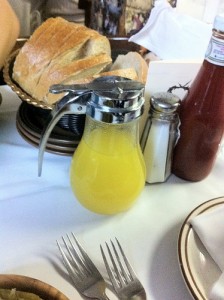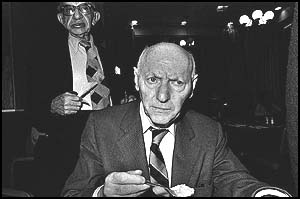The recent post on HG’s long ago Bar Mitzvah posed a challenge to those unfamiliar with Yiddish pronunciation. The ultimate hazard is the proper way to say ch. No, it is not pronounced like “charm” or “change” or “chance.” Thus, the word bucher is not pronounced similar to Sidney “Bechet” or like “butcher” with the elimination of the “t”. In Yiddish “ch” is a guttural sound. Like clearing your throat. It is the “ch” of challah (the egg bread baked with a distinctive twist and consumed on the Sabbath) and other essential culinary words such as chrain (horseradish, the eternal companion of gefilte fish). The sound is hard to master. Even BSK, a trained actress and perfect elocutionist, took some time to make the sound. Of course, after decades of marriage to HG, BSK’s Yiddish “ch” is as good as that of Molly Picon, the late, great star of the Yiddish musical stage. Many Yiddish words have entered common English usage. The only “ch” word that has gained popularity is chutzpah (nervy, arrogant behavior). HG grew up in a Yiddish speaking home. The language was often combined with English in a colorful conglomerate that could be dubbed “Yinglish.” When HG’s parents discussed topics forbidden to little HG like sex they spoke in Russian. The little fellow thought the language sounded musical.
Time For A Yiddish Lesson
December 8th, 2014 § 0 comments § permalink
Listen To The Rebbitsen
May 15th, 2014 § 0 comments § permalink
Okay. For those unacquainted with yiddish, the rebbitsen is the rabbi’s wife. Convinced that women were smarter than men, HG’s Mom often said: “Listen to the rebbitsen.” The presumption was that rabbis were lost in a haze of spiritual, legalistic and other “of the Book” concerns. Rebbitsens, on the other hand, were sound on earthly matters. A recent New York Times obituary of Omaha Rabbi Myer Kripke (died age 100) brought this to mind. Midwest synagogues did not lavish money on their spiritual leaders but Kripke, through inheritance and frugality, managed to accumulate about $65,000 in the early 1960s. Rabbi Kripke and his wife Dorothy, an author of religious books for children, became friends with another Omaha couple, Mr. and Mrs. Warren Buffet. Buffet was achieving a local reputation as an astute money manager. Dorothy Kripke suggested that they turn over their money to Buffet to manage. Kripke demurred. Buffet was only accepting investors who put up $150,000-$250,000. Dorothy (a traditional noodge) kept insisting that Kripke approach Buffet. It took three years but Kripke finally gave in. Buffet, who liked Kripke, made an exception and accepted the money. By the early 90’s that modest sum grew to $25,000,000. Didn’t change the Kripkes. They continued to live modestly and used their wealth for a variety of philanthropic causes. They were guests at the Buffets’ annual Thanksgiving dinners. Knowing their kosher dietary strictures, Mrs Buffet hired an eminent caterer to prepare tuna salads for the the Kripkes.
A Little Nosh
May 9th, 2013 § 0 comments § permalink
Many, many years ago, young newlywed BSK hosted a party (lots of showbiz folks) at HG and BSK’s spacious apartment (a former artist’s studio) on Manhattan’s W. 67th Street. The exuberant actress, the late Shelley Winters arrived and loudly requested a nosh. BSK had been a New Yorker for only a few months and her knowledge of Yiddish was zero (Now, after a half-century with HG, BSK could be a diva on a Second Avenue Yiddish stage). BSK was puzzled. Did loud Ms. Winters want a drink? Was a nosh an exotic variety of martini? Of course, what the loud lady wanted was a snack. Nosh is Yiddish for snack. Noshing (snack eating) was mostly non-existent in the HG boyhood home. Meals were capacious. HG had a modest bite after school (before four hours of violent and active street games) and a glass of milk and a graham cracker before bed. HG is always shocked to see the massively stocked snack aisles at supermarkets and shopper carts filled with salt and fat laden chips and crisps and crackers (plus disgusting sugar and chemical loaded soft drinks). The point has been made many times. The French eat lots of fat and butter. Wash it down with wine. No snacking. Stay slim. (It helps that French portions are much smaller than American and the non-autocentric population does a lot of walking).
Here’s another Shelley Winters anecdote (Obviously, HG cannot vouch for its authenticity. Show biz is replete with nasty anecdotes.): Her ardent lover at the time, an actor, returned from two weeks filming in South America and met Shelley for a quick meal before a lovers’ tryst. Shelley, a gourmand, kept lingering at the table. Her lover, furious, said:”Shelley, it appears you want to fill the wrong cavity.” The affair, needless to say, was over.
Lower East Side Memory
May 16th, 2012 § 0 comments § permalink
Gone from the streets of the ever more trendy Lower East Side of Manhattan are the choppers. Permit HG to explain. HG does nor refer to people with cleavers. The “ch” in HG’s “choppers” is pronounced with a guttural, Yiddish “ch” as in “challah.” In Yiddish the word chop means “grab.” And, that’s what a chopper did. He grabbed you. When little HG accompanied his father on various Lower East Side errands, choppers were stationed outside of men’s clothing stores on East Broadway and Division Streets. They would grab the arm of HG’s father and try to drag him into a store. Meanwhile they offered a sales pitch in heavily accented English: “Come inside. Bargains. The finest materials. Beautiful suits, coats. Latest styles. Take a look. Prices you won’t believe. No harm in looking.” The chopper had a grip like an iron vise. It took real strength (possessed by HG’s father) to extricate oneself from a dedicated chopper.
All of this took place many, many decades ago in a simpler New York. Now geniuses like Wylie Dufresne turn out imaginative food in chic Lower East Side restaurants. Nary a knish or “chopper’ in sight.
SJ here. Allow me to make a brief interjection. True, the Lower East Side has transformed into a hipster playground of trendy bars, cafes, etc. But, like a ghost sign that bleeds through faded paint jobs, elements of the old Lower East Side are still with us. Orchard Street, while gussied up beyond recognition, still houses of number of old clothing stores and, surprise, surprise, an honest to god chopper. Yes, I was recently stopped in my tracks — the grip was that strong — by a middle aged Hasid who said, “Young man, you look like a fellow who could use a nice suit. We have suits, so good, so cheap, come inside…” A relic of the old days, the chopper still has the stuff…And when it comes to knishes!!! We have the best still in operation!!! Yes Yonah Schimmel Knishes is open right on Houston Street and serving up a delicious Knish — get the Kasha!!!
More Schlag, Please, Herr Doktor.
June 4th, 2011 § 40 comments § permalink
With the delicious irony that only Middle Europeans are capable of, waiters at the long departed Eclair Bakery/Restaurant on New York’s West 72nd Street, referred to each other as “Herr Doktor.” Eclair’s heyday was the late 30’s through to the 60s. Its customers were the Europeans, primarily Jewish, who had fled Hitler and wound up, for the most part, in the Washington Heights and Upper West Side neighborhoods of New York. Yes, many of the waiters had been Doctors in Europe, or lawyers, or architects, etc.. In New York they were waiters. They did not bewail their fate. They were alive.
Eclair catered to displaced novelists, musicians, singers, actors, artists and a host of intellectuals of every cerebral and artistic variety. And, the little, bald guy in the corner was Isaac Bashevis Singer (long before he became famous), eating his inevitable (he was a vegetarian) tuna fish sandwich. The women in the Eclair were bosomy, voluble, perfumed and flirtatious. It was a sexy place, echoing Viennese, Budapest and Bucharest coffee houses. The pastries were outstanding. Coffee came adorned with three inches of schlag (whipped cream). It was more than a bakery. Eclair was also a restaurant with outstanding wiener schnitzel, chicken paprikash and other artery clogging specialties of Mittel Europa. A multitude of languages was spoken at Eclair—German, Russian, Polish, Hungarian, Czech, Yiddish, Rumanian. To HG’s young ears it was all music. Eclair was owned by A.M. Selinger, Italian-born, Czech-reared. When he died in 1998 his New York Times obituary summed him up perfectly: “However long they lingered, the Eclair customers found a ready welcome from the proprietor, a small, natty man of legendary conviviality. a wide circle of friends and a vast array of pluperfect pastries.”
Reflections: Yiddish. Food Metaphors. Show Biz.
April 27th, 2011 § 1 comment § permalink
 In the Bronx of HG’s youth, Jewish delicatessens often had a bowl of salami chunks on the counter with a sign: “A Nickel A Shtickel.” The literal Yiddish translation of “shtick” is: “a piece.” You got it. “Shtickel” is the diminutive i.e. “a little piece.” Hungry customers could nibble “ah shtickel” while their pastrami and corned beef orders were being sliced.
In the Bronx of HG’s youth, Jewish delicatessens often had a bowl of salami chunks on the counter with a sign: “A Nickel A Shtickel.” The literal Yiddish translation of “shtick” is: “a piece.” You got it. “Shtickel” is the diminutive i.e. “a little piece.” Hungry customers could nibble “ah shtickel” while their pastrami and corned beef orders were being sliced.
All of this has made HG muse on Yiddish show biz terms. “Shtick”, of course, means a comic routine or a performer’s riff of some type. The term has been broadened to include all sorts of political and sales approaches.
“Schmaltz” is chicken fat. It is also the term for sentimental, over-dramatic emoting. “Schmaltzy” music or “schmaltzy” acting, therefore is that which is solely intended to pluck the heart strings (or clog those heart strings as shmaltz tends to do).
A performer of talent who lacks the ability to emotionally move an audience is known as a “lox.” A curious designation, since “lox” is the salty, highly flavored cut of smoked salmon favored by folk with hearty tastes. In performing terms, the opposite of a “lox” is a “shtarker” — a performer who uses every means at his (or her) disposal to excite or grab an audience (by the “kishkas” as they might say). Al Jolson, Bobby Darin, Liza Minelli, Zero Mostel, Bette Midler, Billy Daniels, Louis Armstrong—all “shtarkers”. The word literally means a tough, strong guy. In the Europe of yesteryear, when Jew haters attacked scholars, merchants, etc., “shtarkers” were summoned — Jewish guys who worked with their hands and who did not back down from a fight.
Amazing to think that many of these Yiddishisms have made the leap from the old, Odessa ghettos to the Lower East Side Vaudville circuit to finally entering our shared American vernacular in such a permanent way that a Presidential speech could be described in a major Newspaper as “schmaltzy.” Certainly a development that the great Boris Thomashefsky couldn’t have foreseen! 
A Shmuchtzeh To BUBBIES
April 3rd, 2011 § 0 comments § permalink
Permit HG to expand your vocabulary. “Shmuchtzeh” is a Yiddish word. It means a big, wet exuberant kiss. And, that is what HG sends those wonderful San Francisco folk who create the BUBBIES brand of pickles and sauerkraut. Through some alchemy they have put old-time Bronx flavor in a jar. You will find BUBBIES at Whole Foods and most other supermarkets. No, HG is not the brand’s press agent but when something is really tasty, generous HG wants to share.



